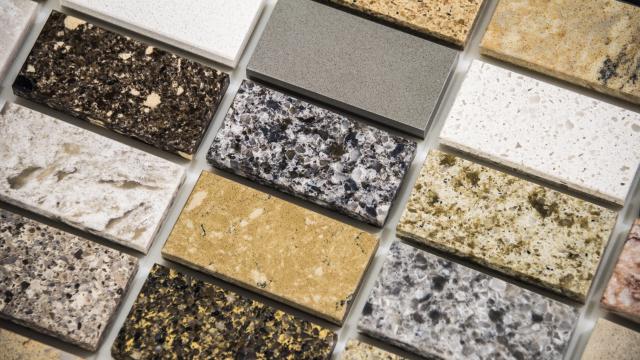Whether you’re building a new home or renovating your kitchen, you’ll have to make a decision about your countertops. If you’d like to go with a natural stone—as opposed to laminate countertops, for example—you can opt for granite, quartz, or marble.
The next step is determining which stone is the best fit for your budget and your household needs. Here are some of the pros and cons of granite, quartz, and marble countertops to consider when making your decision.
Granite countertops
A popular choice since the 1990s, granite is a combination of interlocking mineral crystals that comes in a variety of colors with natural wave-like or speckled patterns.
Pros:
- Very hard, dense, and highly durable
- Can withstand cuts and doesn’t scratch easily
- Heat resistant
- No two granite slabs look exactly alike
- Not as pricey as when it first became mainstream
Cons:
- Stone is brittle and has the potential to chip or crack
- Porous, so if the stone is unsealed (or the seal has worn off over time), it can stain
- Extremely heavy: Not all counters and cabinets can support it
Quartz countertops
An alternative to granite, quartz is stone (90% quartzite) that has been processed and sealed into a protective epoxy resin (the remaining 10%). Though specific prices depend on the variety, generally speaking, quartz costs roughly the same as granite.
Pros:
- Harder than granite and highly durable
- Set-it-and-forget it: No need to reseal
- Nonporous, so it’s more hygienic, water-resistant, stain-resistant, and easier to keep clean
Cons:
- Not heat-resistant
- Doesn’t hold up as well outdoors as it can be damaged by extreme sun exposure
Marble countertops
Considered the most luxurious of the natural stones, marble is known for its distinctive veining and classic look.
Pros:
- High-impact design that can elevate an entire room
- The softness of the stone makes it easier to buff out scratches and stains
- Heat resistant
Cons:
- Expensive
- Porous: Needs to be sealed
- Softness of the stone means it can scratch easily
- Certain cleaning products and methods can cause damage
If it turns out that natural stone isn’t the right fit for you after all, there are still plenty of other countertop options to consider, including butcher block, concrete, and tile, among others.

Leave a Reply
You must be logged in to post a comment.